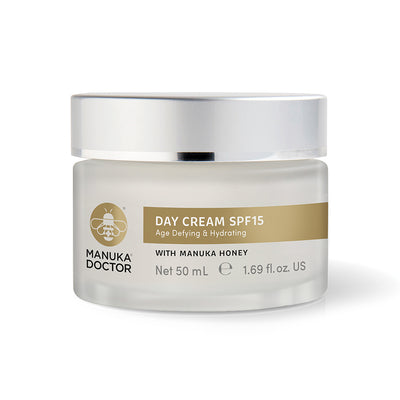Hot flushes, night sweats... yes, menopause really is a barrel of laughs. But unfortunately, for many women, it doesn’t stop there. Those hormonal swings and roundabouts may have noticeable effects not only on your skin but your crowning glory too.
How exactly does the menopause affect your skin?
You probably already know that the hormone oestrogen takes a nose-dive as you go through the menopause. This leads to a decline in your skin’s levels of fat, water and collagen, which is the major structural protein found in skin and connective tissue – in fact, there’s a 30% drop in collagen in the first five years after menopause.1 As a result of this triple whammy, your skin loses strength, moisture and elasticity, leaving it prone to wrinkles, dryness and sagging, according to a 2003 study by the University of Nottingham.2
Skin also becomes thinner because of the menopause, putting it at risk of bruising or damage from simple day-to-day activities. Skin thins naturally as we get older due to a tapering off in collagen production. Sun damage can play a part in long-term skin thinning, too.3
But after the menopause, the flow of blood through your smallest blood vessels, the capillaries, also slows – and this means less oxygen and nutrients being transported to the skin, which also contributes to thinning.4
And what about your hair?
Those hormonal fluctuations have a lot to answer for when it comes to your hair. Heard of ‘female pattern hair loss’, medically known as androgenetic alopecia? This type of hair thinning can occur around the crown or sides of your head, or over your whole head. It commonly starts around the time of the menopause because of changing levels of oestrogen and another hormone, progesterone.5
How to support your skin and hair through the menopause
Okay, there’s nothing we can do to stop the menopause, but you can still curb its effects on your skin and hair:
Tweak your daily hair and skin routine
First off, make sure you apply sunscreen every day, for example Manuka Doctor Day Cream SPF50 – it can help prevent both skin thinning and the development of new wrinkles, according to the American Academy of Dermatology.6 For dry skin, switch to a mild facial cleanser, such as Manuka Doctor Hydrating Facial Cleanser, as soap can be too harsh for your skin. Moisturise well after showering or bathing, too.7
When it comes to hair care, don’t brush your hair when it’s wet – it’s more prone to breaking – and protect your scalp from sun damage with a sunhat.8
Take a supplement that can support skin and hair through the menopause
As well as eating a healthy, balanced diet, look out for a supplement that’s a source of hair and skin-friendly nutrients, like Manuka Plus Bee’s For Your Bonnet. It contains a range of key nutrients, including zinc, which is needed to break down protein,9 for example for the growth and repair of collagen and also keratin, the protein found in hair and skin. Manuka Plus Bee’s For Your Bonnet is also a source of biotin, important for hair and skin health, according to the European Commission,10 and selenium, a trace mineral that’s key to hair and nail growth.11 Another useful ingredient is royal jelly: a 2010 Korean study found it may stimulate collagen production.12
Speak to your GP
Make sure you also talk to your doctor about your symptoms to rule out any other health conditions and triggers, as well as discussing treatments that might be worth investigating. For example, some medications can cause hair loss, for example antibiotics, antidepressants and cholesterol-lowering drugs.13
Your GP may refer you to a dermatologist or trichologist, who can prescribe medication or advise on aesthetic treatments, like laser therapy.



